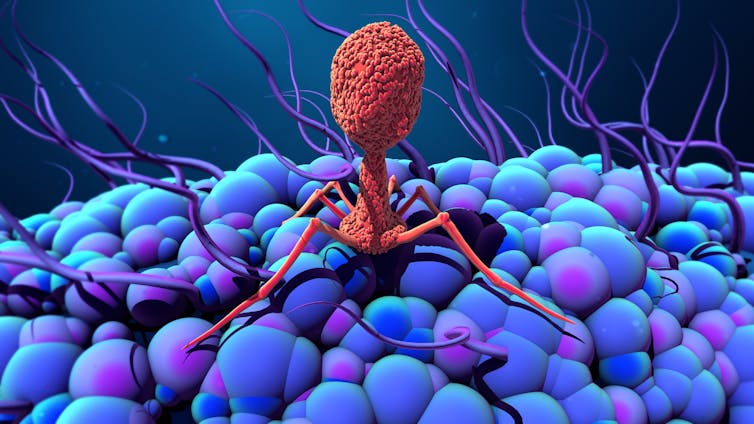In defence of viruses

Every day, in countries all over the world, people are dying because of a new virus. This time they are dying from a new strain of coronavirus called SARS-CoV-2 that causes the acute respiratory disease known as COVID-19. And this is just the latest. Viruses are responsible for the deaths of millions of people throughout history, from smallpox to flu.
In this time of worry and self-isolation, it is easy to think that viruses are our enemies. And of course, it’s true that some of them are. Sars, Mers, Ebola, HIV, swine flu, bird flu and Zika are among those that have caused deadly outbreaks in recent years – but the list is very long.
However, it’s also true that the vast majority of viruses do not infect human beings at all, or even mammals. And many of these viruses could actually be good for us, either by promoting our health or saving us from other diseases.
It’s easy to forget that most life is microscopic. And, just like viruses specific to mammals infect mammalian cells, a multitude of viruses have evolved to be experts at infecting the cells of bacteria. These viruses are called bacteriophages (or phages, for short).
Whereas bacteria are living organisms made from a single cell, a virus is a biological entity comprising a bundle of genetic material wrapped in a protein coat. It lacks the means to ensure its own independent existence so it infects a host cell to hijack its cellular machinery, enabling the virus to make copies of itself. To do this, it attaches itself to the cell’s surface and injects its genetic material into the cell where it can take control.
The principle is the same for viruses of humans and viruses of bacteria. Scientists have studied bacteriophages for decades, observing how phages can spread through a population of bacteria, first infecting and then bursting open cells as they rapidly multiply.
Or alternatively, how they can co-exist with remarkable stability, often sustaining a diverse community of bacterial species in environments such as the open oceans or the human gastro-intestinal tract. They do this by preventing any single bacterium from growing to become too dominant, a lot like the way animal predators keep prey populations under control.
 Viruses are increasingly seen as essential to the microbe communities inside our body. Anatomy Insider/Shutterstock
Viruses are increasingly seen as essential to the microbe communities inside our body. Anatomy Insider/Shutterstock
The more we understand phages, the more we are starting to view them as an essential component of microbial ecosystems, maintaining diversity and functionality rather than acting as agents of disease. For example, it is now known that a diverse microbiota – the community of micro-organisms living in our guts – is associated with health in humans.
This includes the proper functioning of the immune system, the absorption of nutrients in the intestine and even our changing moods and behaviour. Phages play a key role in maintaining this diversity and are therefore, at the level of the microbial ecosystem within us, contributors to overall human wellbeing.
Another fascinating area of virus research is phage therapy. A virus specific to a harmful bacterium can in principle eradicate this infection from the human body, leaving human cells untouched. In this era of antibiotic resistance, when more and more harmful bacteria are developing resistance to our commonly used antibiotics, fighting bacteria with phages is a promising strategy.
Antibiotics usually kill a broad range of bacteria, often including the ones that benefit us as well as the disease-causing organism we want to kill. But a phage can be used with precision, like a programmed bullet that only seeks out the invading bacterium.
Inter-viral warfare
Viruses can also be used to fight other viruses. In a recent study of rhesus monkeys and the simian immunodeficiency virus (SIV), researchers found that another virus, rhesus cytomegalovirus, could be coerced to produce the same proteins as SIV. This meant it could be used as a vaccine to effectively teach the monkey’s immune system how to fight off SIV without exposing it to the harmful virus, a response that is maintained over time.
This is particularly important because immunodeficiency viruses have become experts at hiding from their host’s immune system by mutating, making it very hard for the body to develop a defence on its own. This work has huge implications for HIV treatment in the future.
It is easy to take a viral infection personally, attributing malice and cruelty to an unwelcome biological phenomenon. But the actions of a virus are, in many respects, as indifferent as the weather. And just like accurate weather forecasting can save lives, understanding the multifaceted nature of viruses in our world can also save lives.
It is the effective development and use of vaccines, after all, that has nullified the catastrophic effects of some of the world’s deadliest infections. Knowing how a virus spreads and how it operates can also inform government policy and allow us to behave in ways that keep us safe.
So, when dealing with those viruses that are, in a very real sense, our enemies, it is better to meet them with understanding rather than with fear. For those of us who feel that particular viruses are evil, even metaphorically, we should remember the words of Carl Jung: “Understanding does not cure evil, but it is a definite help, inasmuch as one can cope with a comprehensible darkness.”
Hugh Harris, Postdoctoral researcher in Microbiology and Bioinformatics, University College Cork
This article is republished from The Conversation under a Creative Comons license. Read the original article.
